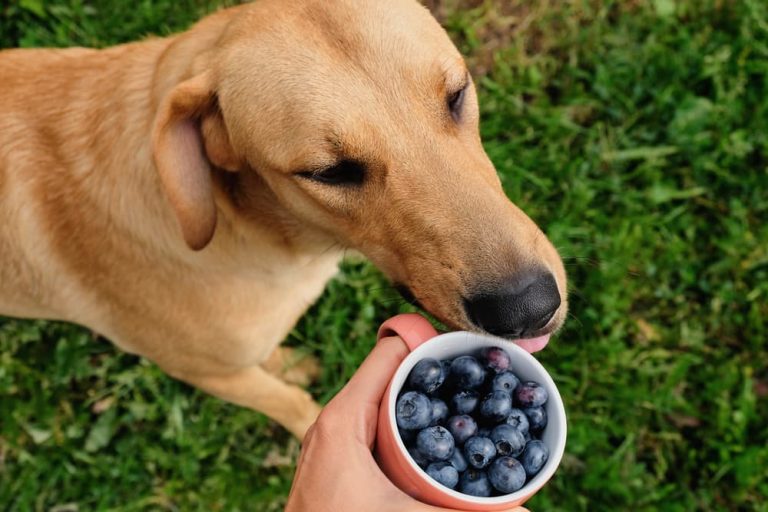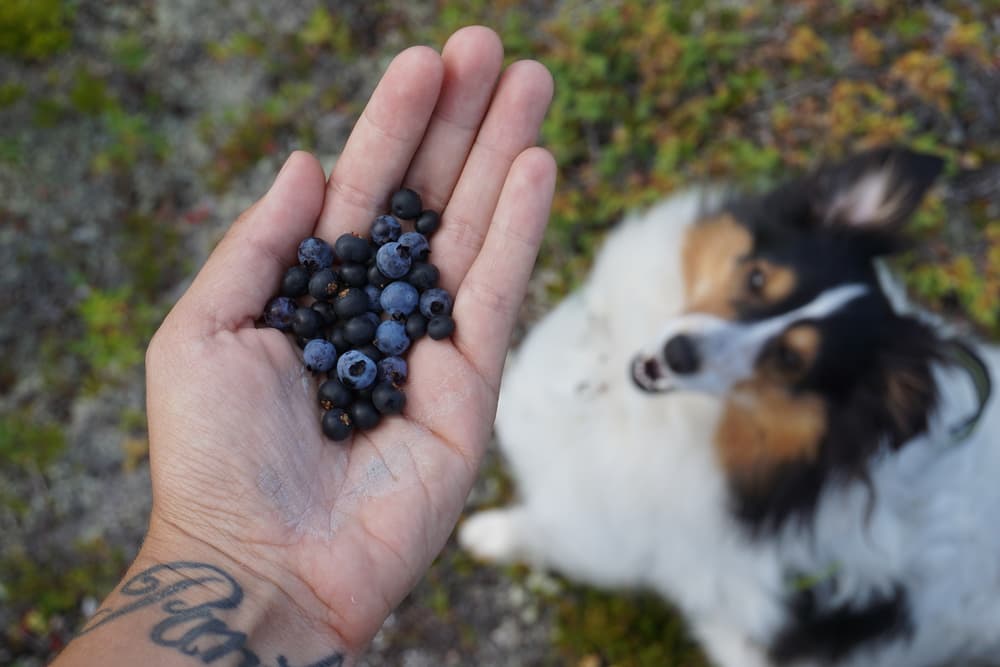Can Dogs Eat Blueberries?

Like papaya, cheese, and carrots, blueberries are one of those foods that could easily double as a dog treat or get gobbled up quickly if dropped in the kitchen with a hungry scavenger nearby. But can dogs eat blueberries and—more importantly—are they actually good for them?
We asked a veterinarian to answer some of the most frequently asked questions surrounding canines and blueberries. Curious about whether blueberries are safe for dogs, if they impart any health benefits, and which blueberry-infused human foods are dog-friendly (or not)? Here’s everything you need to know.
Can Dogs Eat Blueberries?

Yes! According to North Carolina-based veterinarian Dr. Judy Morgan, who specializes in integrative veterinary medicine, blueberries are a great alternative to store-bought goodies.
Naturally bite-sized, portable, and delicious, blueberries are safe to use as a reward while dog training. You could also use them as a fancy food topper for special occasions like birthdays or adoption anniversaries.
Are Blueberries Good for Dogs?

“Blueberries are a very healthy treat and food addition for dogs,” says Morgan.
A well-known “superfood,” blueberries are good for dogs, providing canines with some of the same health benefits they pass on to humans. For this reason, you might find this powerful berry on the ingredients list for some dog treats. (More on this later!)
So, what are the benefits of blueberries for dogs? For one, they’re packed with anthocyanins, the fancy term for a type of antioxidant that fights free radicals or unstable atoms that destroy cells and speed up aging, says Morgan.

Antioxidants help protect your pooch’s body and brain from these microscopic, destructive forces. This is especially key for older dogs. In fact, studies show a more antioxidant-rich diet can lower the effects of cognitive decline in seniors (1.)
Blueberries also offer up plenty of vitamin C and health-boosting plant-based nutrients, as well as fiber, which helps feed the beneficial bacteria in your dog’s gut that promote a healthy immune system, notes Morgan.
For all the benefits attributed to blueberries, there are some that remain unproven. For example, blueberries are often credited with helping to cure urinary tract infections (UTIs) or remove tear stains from underneath your pup’s eyes. However, according to Morgan, the jury is still out.

“There’s little scientific evidence to support the use of blueberries to treat UTIs—but they won’t hurt, either,” says Morgan.
As far as tear stain removal goes, these rust-colored marks can happen for a number of reasons—one of which may be bacteria on the surface of a dog’s eyes or skin. So changing your dog’s microbiome for the better with foods like blueberries could lead to improvements, says Morgan. But, again, there’s no research to back this up as a go-to treatment.
Are Blueberries Bad for Dogs?

Blueberries aren’t bad for dogs. Generally, they’re safe for puppies, adult dogs, and seniors, alike. If you have a particularly small dog, keep in mind that they could be a choking hazard—so consider chopping or mashing them up.
One potential downside: If you feed your pup very large quantities of blueberries, they could end up with an upset stomach or diarrhea, says Morgan. That’s why it’s important to think of blueberries as an occasional treat to be enjoyed in moderation…not served by the bucket-full.
Blueberries and Dogs: Feeding Tips

It’s okay to feed your dog fresh or frozen blueberries. Both options are healthier choices than dried blueberries, which can be high in added sugar and preservatives.
When preparing blueberries for your pup, wash them thoroughly with fresh water to remove any dirt or pesticides, just as you would for yourself, before serving them to your dog.
If you’re wondering just how many blueberries your dog can eat (and how often), follow the 10 percent rule: About 90 percent of your dog’s diet should be devoted to a dog food that provides complete and balanced nutrition. The rest can go to snacks like dog-friendly fruits, veggies, and treats, including blueberries.

Of course, what this portion looks like will depend on the size of your dog. “Anywhere from a few blueberries a day for very small dogs to up to ¼ cup twice daily for larger dogs should be fine,” says Morgan.
As far as other treats go, consider most blueberry-based human foods off-limits for dogs. Don’t feed your little one baked goods like blueberry muffins or pancakes, which are often high in sugar and other ingredients that aren’t good for dogs, advises Morgan. The same goes for yogurt products with large amounts of added sugars or those containing artificial sweeteners, which can be toxic to dogs.
When serving your pup blueberries for the first time, watch them closely to detect any signs of an adverse reaction. Be sure to consult with your veterinarian if you have any questions or concerns about including blueberries in your dog’s diet.









